Ghana
Around the age of 13, my mother wanted to give me to a man who could have been my father, I refused": At 26, Ghanaian painter Awanle Ayiboro Hawa Ali made forced child marriage her "fight".
"At that time, I was always with my parents and I obeyed them. They told me that I would have to go to this man, cook for him, clean his house, but I I didn't want this life, I wanted to become a journalist", says the one who exhibits for the first time about fifteen solo works in the Parisian gallery Mathilde Le Coz.
"I had to fight and manage to involve members of my family, my uncle, and my aunt. When I became an adult and an artist, I decided to make it my subject because I realized that the less one speaks, the more it is like a spreading pandemic,” she adds via videoconference from the Artemartis studio, a house workshop she shares in Accra with other artists from West Africa.
"It's a global problem that also affects Mali, Nigeria or Zimbabwe", underlines the young woman, who sees herself "as much as a creative person as a spokesperson".
Her little girls painted in shades of blue tell her story and that of many women who were forced into marriage when they were children.
By reclaiming their stories, Awanle Ayiboro Hawa Ali intends to give them back this "stolen childhood", a work "influenced by (her) own history" and "dedicated to all women who live in conservative societies", she says.
Amina in uniform, Amina playing, Zeinab at 11, little girls in ruffled dresses and dark eyes, sometimes accompanied by mothers, very expressively reflect their reinvented past against a backdrop of feminist demands and for the defense of rights. children.
"Goro"
One of the paintings represents Aïsha with her sister, to whom a man, who wishes to take her as his wife, has offered a red candy, the "goro", a symbol of the exchange of his freedom negotiated with his family. At the top and right of the painting, two words, partly cut out: "Watch Children" (watch the children).
"With this exhibition called +Playground+, I decided to portray women who are in their twenties but whom I painted as children because, one day, they were and their innocence, their naivety, their dreams, have been taken away from them”, explains the young woman.
She intends to continue her awareness work to "make a difference" and "show the way" towards emancipation, aware however of the complexity of the issues.
"It is a subject governed by religious questions but it is also a question of poverty because certain families exchange the women children against money. It is also a means of controlling the sexuality of women, especially in mediums poor and remote", she analyzes.
"Today I'm 26, I'm not ready to settle down, I don't want to be pressured, I think marriage should be a choice because it's the journey of a life and I want to be happy", adds the artist.
The eldest of four children of Muslim parents from northern Ghana, Awanle Ayiboro Hawa Ali, born in 1997, grew up in Accra and left home after high school to work as a receptionist in a hotel.
It was during this time that she learned to draw and paint "by watching tutorials on YouTube". She has dedicated herself solely to her art for four years.
She has participated in several collective exhibitions in Ghana, the United States, London, and Dubai.



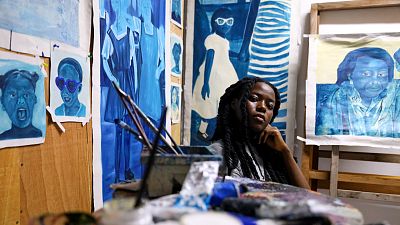

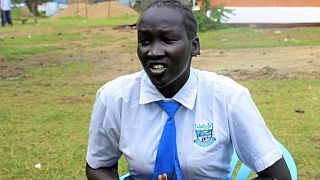
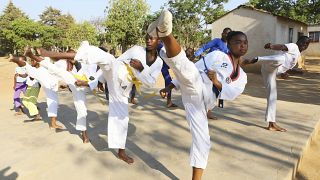
![Lyal protect: mobile app to fight child marriage in Chad [The Morning Call]](https://static.euronews.com/articles/605559/320x180_605559.jpg)
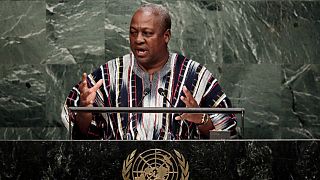
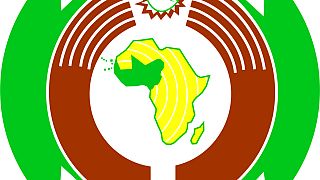




Go to video
Ghana: Tensions rise as chief justice Torkornoo suspended
02:19
Exhibition honours Spanish artist Mariano Bertuchi’s vision of Morocco
Go to video
Artist Kehinde Wiley puts power in a new frame with paintings of African leaders
Go to video
China says 3 Chinese crew members suspected of being kidnapped from a boat off Ghana are safe
01:36
3D telemedicine brings healthcare to rural Ghana
06:45
Maasai Girls learn self-defence to fight Gender-Based Violence